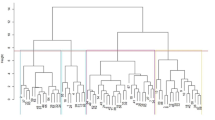Abstract
In this commentary, we address the critical importance of the research literature documenting therapist differences in skill and outcomes. In particular, we focus on the implications of therapist differences for patient-centered decision making, including the matching of patients to specific psychotherapists who have empirically-based track records of positive performance. In addition, we present preliminary results from a grant supported study of patients’ values and preferences regarding the use of provider performance track records in routine mental health care decision making.
Similar content being viewed by others
References
Adams, J. R., & Drake, R. E. (2006). Shared decision-making and evidence-based practice. Community Mental Health Journal, 42, 87–105. doi:10.1007/s10597-005-9005-8.
Baldwin, S. A., & Imel, Z. E. (2013). Therapist effects: Findings and methods. In M.J. Lambert (Ed.), Bergin and Garfield’s handbook of psychotherapy and behavior change (pp. 258–297). Hoboken, NJ: Wiley.
Barkham, M., Lutz, W., Lambert, M. J., & Saxon, D. (2016). Therapist effects, effective therapists, and the law of variability. In L. G. Castonguay & C. E. Hill (Eds.), Therapist effects: Toward understanding how and why some therapists are better than others. Washington DC: American Psychological Association.
Boswell, J. F., Constantino, M. J., Kraus, D. R., Bugatti, M., & Oswald, J. (2015). The expanding relevance of routinely collected outcome data for mental health care decision making. Administration and Policy in Mental Health and Mental Health Services Research. doi:10.1007/s10488-015-0649-6.
Boswell, J. F., Gallagher, M. W., Sauer-Zavala, S. E., Bullis, J., Gorman, J. M., Shear, M. K., … Barlow, D. H. (2013). Patient characteristics and variability in adherence and competence in cognitive-behavioral therapy for panic disorder. Journal of Consulting and Clinical Psychology, 81, 443–454.
Boswell, J. F., Kraus, D. R., Constantino, M. J., Bugatti, M., & Castonguay, L. G. (2016a). Implications of the therapist effect for routine practice, research, and training. In L. G. Castonguay & C. E. Hill (Eds.), Therapist effects: Toward understanding how and why some therapists are better than others. Washington DC: American Psychological Association.
Boswell, J. F., & McHugh, R. K. (2016b). Learning from research. In J. C. Norcross, G. R. VandenBos & D. K. Freedheim’s (Eds.), APA handbook of clinical psychology (Volume 5): Education and Profession (pp. 269–283). Washington D.C.: American Psychological Association.
Castonguay, L. G., & Hill, C. E. (Eds.). (2016). Therapist effects: Toward understanding how and why some therapists are better than others. Washington DC: American Psychological Association.
Churchill, R., Khaira, M., Gretton, V., Chilvers, C., Dewey, M., Duggan, C., & Lee, A. (2000). Treating depression in general practice: Factors affecting patients’ treatment preferences. British Journal of General Practice, 50, 905–906.
Cochran, B. N., Pruitt, L., Fakuda, S., Zoellner, L. A., & Feeny, N. C. (2008). Reasons underlying treatment preference: An exploratory study. Journal of Interpersonal Violence, 23, 276–291.
Constantino, M. J., Boswell, J. F., Coyne, A. E., Kraus, D. R., & Castonguay, L. G. (2016). Who works for whom and why? Integrating therapist effects analysis into psychotherapy outcome and process research. In L. G. Castonguay & C. E. Hill (Eds.), Therapist effects: Toward understanding how and why some therapists are better than others. Washington DC: American Psychological Association.
Critchfield, T. S., & Kollins, S. H. (2001). Temporal discounting: Basic research and the analysis of socially important behavior. Journal of Applied Behavior Analysis, 34, 101–122.
Crits-Christoph, P., Connolly Gibbons, M. B., & Mukherjee, D. (2013). Psychotherapy process-outcome research. In M. J. Lambert (Ed.), Bergin and Garfield’s handbook of psychotherapy and behavior change (6th edn., pp. 298–340). Hoboken, NJ: Wiley.
DeRubeis, R. J., Cohen, Z. D., Forand, N. R., Fournier, J. C., Gelfand, L. A., & Lorenzo-Luaces, L. (2014). The Personalized Advantage Index: Translating research on prediction into individualized treatment recommendations. A demonstration. PLoS One, 9(1), e83875. doi:10.1371/journal.pone.0083875.
Given, J. L., Houston, T. K., Van Voorhees, B. W., Ford, D. E., & Cooper, L. A. (2007). Ethnicity and preferences for depression treatment. Psychiatry and Primary Care, 29, 182–191.
Hamburg, M. A., & Collins, F. S. (2010). The path to personalized medicine. The New England Journal of Medicine, 363, 301–304. doi:10.1056/NEJMp1006304.
Henderson, A., & Henderson, S. (2010). Provision of a surgeon’s performance data for people considering elective surgery. Cochrane Database of Systematic Reviews, 11, CD006327. doi:10.1002/14651858.CD006327.pub2.
Imel, Z. E., Baer, J. S., Martino, S., Ball, S. A., & Carroll, K. M. (2011). Mutual influence in therapist competence and adherence to motivational enhancement therapy. Drug and Alcohol Dependence, 115, 229–236. doi:10.1016/j.drugalcdep.2010.11.010.
Imel, Z. E., Sheng, E., Baldwin, S. A., & Atkins, D. C. (2015). Removing very low-performing therapists: A simulation of performance-based retention in psychotherapy. Psychotherapy, 52, 329–336.
Institute of Medicine Committee on Redesigning Health Insurance Performance Measures, Payment, and Performance Improvement Programs. (2007). Rewarding provider performance: Aligning incentives in Medicare: Pathways to quality health care series. Washington, D.C.: National Academies Press.
Ketelaar, N. A. B. M., Faber, M. J., Flottorp, S., Rygh, L. H., Deane, K. H. O., & Eccles, M. P. (2011). Public release of performance data in changing the behaviour of healthcare consumers, professionals or organisations. Cochrane Database of Systematic Reviews, 11, CD004538.
Kielser, D. J. (1966). Some myths of psychotherapy research and the search for a paradigm. Psychological Bulletin, 65, 110–136.
Kraus, D. R., Bentley, J. H., Alexander, P. C., Boswell, J. F., Constantino, M. J., Baxter, E. E., & Castonguay, L. G. (2016). Predicting therapist effectiveness from their own practice-based evidence. Journal of Consulting and Clinical Psychology, 84, 473–483. doi:10.1037/ccp0000083.
Kraus, D. R., Castonguay, L. G., Boswell, J. F., Nordberg, S. S., & Hayes, J. A. (2011). Therapist effectiveness: Implications for accountability and patient care. Psychotherapy Research, 21, 267–276.
Kraus, D. R., Seligman, D. A., & Jordan, J. R. (2005). Validation of a behavioral health treatment outcome and assessment tool designed for naturalistic settings: The Treatment Outcome Package. Journal of Clinical Psychology, 61, 285–314.
Ricks, D. F. (1974). Supershrink: Methods of a therapist judged successful on the basis of adult outcomes of adolescent patients. In D. F. Ricks, M. Roff & A. Thomas (Eds.), Life history research in psychopathology. Minneapolis, MN: University of Minnesota Press.
Saxon, D., & Barkham, M. (2012). Patterns of therapist variability: Therapist effects and the contribution of patient severity and risk. Journal of Consulting and Clinical Psychology, 80, 535–546. doi:10.1037/a0028898.
Scanlon, D. P., Lindrooth, R. C., & Christianson, J. B. (2008). Steering Patients to Safer Hospitals? The Effect of a Tiered Hospital Network on Hospital Admissions. Health Services Research, 43, 1849–1868.
Shumway, M., Saunders, T., Shern, D., Pines, E., Downs, A., Burbine, T., & Beller, J. (2003). Preferences for schizophrenia treatment outcomes among public policy makers, consumers, families, and providers. Psychiatric Services, 54, 1124–1128.
Swift, J. K., & Callahan, J. L. (2010). A comparison of client preferences for intervention empirical support versus common therapy variables. Journal of Clinical Psychology, 66, 1217–1231. doi:10.1002/jclp.20720.
Swift, J. K., Callahan, J. L., & Vollmer, B. M. (2011). Preferences. In J. C. Norcross (Ed.), Psychotherapy relationships that work: Evidence-based responsiveness (2nd edn., pp. 301–315). New York: Oxford University Press.
van Schaik, D.J.F., Klijn, A.F.J., van Hout, H.P.J., van Marwijk, H.W.J., Beekman, A.T.F., de Haan, M., & van Dyck, R. (2004). Patients’ preferences in the treatment of depressive disorder in primary care. Psychiatry and Primary Care, 26, 184–189.
Wampold, B. E., Baldwin, S., Grosse Holtforth, M., & Imel, Z. E. (2016). There are therapist effect but what characterizes effective therapists. In L. G. Castonguay & C. E. Hill (Eds.). Therapist effects: Toward understanding how and why some therapists are better than others. Washington DC: American Psychological Association.
Wampold, B. E., & Brown, G. S. (2005). Estimating variability in outcomes attributable to therapists: A naturalistic study of outcomes in managed care. Journal of Consulting and Clinical Psychology, 73, 914–923. doi:10.1037/0022-006X.73.5.914.
Wampold, B. E., & Imel, Z. E. (2015). The great psychotherapy debate: The evidence for what makes psychotherapy work (2nd edn.). New York: Routledge.
Funding
This study was funded by the Robert Wood Johnson Foundation (#73049; Principal Investigators Dr. Boswell and Dr. Constantino).
Author information
Authors and Affiliations
Corresponding author
Ethics declarations
Conflict of interest
Dr. Boswell declares that he has no conflict of interest. Dr. Constantino declares that he has no conflict of interest. Dr. Kraus declares that he has no conflict of interest.
Ethical Approval
All procedures performed involving human participants were in accordance with the ethical standards of the University at Albany, SUNY and University of Massachusetts, Amherst Institutional Review Boards, and with the 1964 Helsinki declaration and its later amendments or comparable ethical standards.
Informed Consent
Informed consent was obtained from all individual participants included in this study.
Rights and permissions
About this article
Cite this article
Boswell, J.F., Constantino, M.J. & Kraus, D.R. Harnessing the Therapist Effect in Patient-Centered Mental Health Care Decision Making. Adm Policy Ment Health 44, 724–728 (2017). https://doi.org/10.1007/s10488-016-0789-3
Published:
Issue Date:
DOI: https://doi.org/10.1007/s10488-016-0789-3




